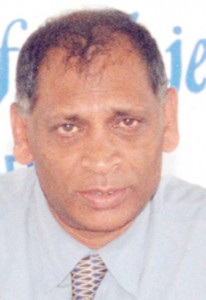Minister of Health, Dr Leslie Ramsammy yesterday strongly defended direct drug purchases from the New Guyana Pharmaceutical Corporation (NGPC) as compliant with a Cabinet decision but he also announced that his ministry will request a renewal of a decision which would also allow procurement from several international suppliers.
 The minister’s press conference was called to address the issue followed an article in Tuesday’s edition of Stabroek News in which opposition MPs questioned the government continuing to allow NGPC to benefit from a cabinet decision that precludes it from going to tender for the provision of drugs to the Ministry of Health. The issue was raised by opposition members of parliament during a recent sitting of the Public Accounts Committee (PAC).
The minister’s press conference was called to address the issue followed an article in Tuesday’s edition of Stabroek News in which opposition MPs questioned the government continuing to allow NGPC to benefit from a cabinet decision that precludes it from going to tender for the provision of drugs to the Ministry of Health. The issue was raised by opposition members of parliament during a recent sitting of the Public Accounts Committee (PAC).
Ramsammy said yesterday that he was not sure if all the parliamentarians quoted were members of the PAC, but they “grossly and mischievously misrepresented or misunderstood [the issue]. “The Minister of Health states unequivocally that its procurement of drugs and medical supplies [is] in compliance with cabinet’s decision and in accordance with all laws and regulations.”
He said his ministry’s procurement arrangements have been “rigidly scrutinised since 1992”.
He added, “By and large” the Auditor General (AG) has been able to show compliance by the Ministry of Health to procurement laws and rules. “The Auditor General did not question the legality or appropriateness of the waiver arrangement granted by Cabinet Decision in 1997 and in 2003.” He acknowledged that the AG’s report did recommend that the two waiver decisions be renewed.
The Auditor General’s report for 2004 had made a recommendation that the ministry advertise internationally every three years for the supply of drugs and medical supplies and pre-qualify suppliers.
That report also said that given the time period that would have elapsed “it would appear necessary for the present arrangements for the supply of drugs and medical supplies from overseas to be reviewed”. The following year’s report said that in relation to purchases exceeding $600,000, 21 purchases valued at $174.914 million were made from specialised agencies overseas on an approval, which had been granted by cabinet in 1997. It was recommended that the ministry advertise in at least one publication of wide international circulation for the supply of drugs and medical supplies.
Not time bound
In the article published in Tuesday’s edition of Stabroek News, Alliance For Change (AFC) parliamentarian, David Patterson, had said, “Government via a cabinet decision made in 1997 – instructed the Minister of Health to make all local purchases from New GPC, so for 11 years there have been no public tendering for drugs to be supplied to this ministry, this contravenes the public procurement act.”
Patterson said that in 2005 the contract was worth approximately $600 million. The statements were also made in the context of NGPC being one of the subsidiaries of QA11 which saw several of its new planned investments being controversially granted tax concessions recently.
However, Ramsammy said that in 1997 it was in fact IDA, PAHO/WHO and UNICEF that the waiver was aimed at as those agencies were recognised for their bulk purchases and for passing on savings to countries. He said his ministry did not interpret the decision by cabinet of 1997 to be time-bound and limited to purchases of that year.
The waiver aimed at NGPC came into play in 2003 and this also was not time-bound, according to the minister, as Cabinet had made the decision after he made a request in order to improve procurement and supplies to the health sector. He said several local suppliers were provided with the IDA price list and given the opportunity to make proposals for the supply of medicines and commodities on condition that the quality and price and the ability to deliver medicine on a timely basis be competitive with IDA. “The NGPC submitted a detailed proposal which the Ministry of Health believed would improve the supply chain arrangements,” the minister said.
According to the minister, the 2003 waiver was not the first time the Government of Guyana entered into such arrangement with NGPC. He said prior to 1992 the then GPC was the sole procurement agency for the health sector and that arrangement was suspended after 1993 but subsequently resumed after cabinet’s decision in 2003.
And according to the minister the NGPC has also been involved in the open tender process. For example, he said NGPC successfully won the international tender for the provision of anti-retroviral (ARV) medicines after two companies had also submitted bids.
On another front, the minister said his ministry had provided the opportunity for many suppliers to provide drugs and medical supplies but over the years had encountered difficulties as various suppliers proved unreliable. One such example, he said, was the contracts to supply for milk in the last two years which has seen the non-provision of the commodity because the supplier was unable to obtain the milk at the price he tendered.
‘Cash cow’
Meanwhile, another concern for Patterson was the payment methodology employed by the ministry to the NGPC. He described it as the company being on a “cash cow, they have to expand little in way of finance and have a guaranteed source of finance.” He said the ministry pays the company 100 per cent at the contract signing.
But Ramsammy said procurement from local and overseas agencies were on a pay-first basis. And payments to NGPC were always secured through financial security arrangements. “It is therefore mischievous to give the impression that the Ministry of Health favours the NGPC by payment upfront for its drugs and medical supplies. The Ministry of Health’s payments to the NGPC, moreover, [are] with local currency and savings accrue because the government does not have to purchase foreign currency.”
In addition, he said, the NGPC facilitates storage for the ministry’s supplies with no additional cost. The minister said since many of the drugs procured from the company are available through its warehouse, the ministry did not have to take its supplies through one-time block shipment and this ensured that drugs did not expire because of slow use by the sector. “Unlike the international suppliers, NGPC ensures product security and quality to the ministry’s warehouse. Other suppliers do not take responsibility after the item is shipped,” the minister said.
Further, all the company’s manufacturing processes are guided by Good Manufacturing Practices (GPM) and Current Good Manufacturing Practices (CGMP) which emphasize uncompromising quality control and maximum productivity. The company also maintains stocks of several thousand items of raw and packaging materials so as to be able to fulfil orders in a timely manner which is useful in times of emergency such as the 2005 Great Flood.
Sourcing drugs from the company, according to the minister, also enabled the ministry to get products supplied to specification, reduced shipping costs and time and enabled custom packaging.
Additionally, Ramsammy said that NGPC has not supplied any substandard drugs and produces a range of generic, over-the-counter and veterinary products.
NGPC also has the facilities to manufacture products to any specification in precise quantities and this eliminates the need for over-ordering. “One example is the bird flu medication for which the company is ready if there is an emergency”, Ramsammy said.
The local company is also attractive because of reduced shipping time. “When the MOH was sourcing its supplies from other overseas companies it was required to pay in advance for everything. In addition there was a 3-6 months wait before the orders were delivered since these companies had to source everything from various suppliers all over the world”, the statement said.





